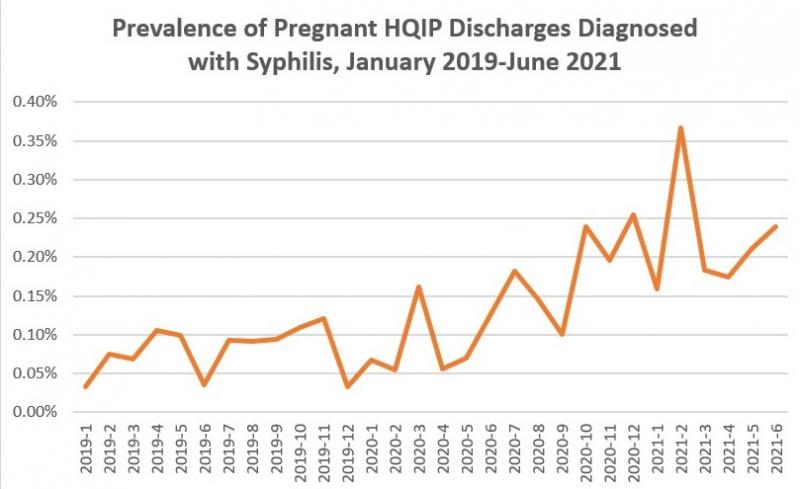The Hospital Quality Institute (HQI) through its Sentinel Signal Detection System has identified a significant increase in syphilis diagnoses among pregnant patients from 2020-2021. Specifically, the figure below indicates that syphilis prevalence doubled among pregnant patients from 2020 through June 2021 compared to 2019 (0.16% vs. 0.08%).
The elevated syphilis prevalence is not unique to California. A recent JAMA study suggests that syphilis nearly doubled in Southeastern Texas during the pandemic among pregnant patients. Relatedly, the CDC reports a 291% increase in congenital syphilis nationwide since 2015.
Congenital syphilis is easily preventable and if left untreated can lead to severe morbidity in infants. Screening is important during prenatal care with recommendations for rescreening during the third trimester and during delivery for high-risk women.
Although the exact cause for the syphilis rate increase during the pandemic is still under investigation, multiple sources suggest that STI clinic closures, reduced office hours, delayed care, suboptimal testing due to reallocation of resources to COVID-19 have all been identified as contributing factors in the disruption of care.

| Time Period | Change in Syphilis Prevalence among Pregnant Patients | p value | Statistical Interpretation |
|---|---|---|---|
| 2020 vs. 2019 | +0.0574% | < .05 | Significant |
| 2020 to June 2021 vs. 2019 | +0.0825% | < .05 | Significant |
These alerts are made possible by timely hospital submissions of discharge data to the Hospital Quality Improvement Platform (HQIP) and safety reports to the Collaborative Healthcare Patient Safety Organization. Thank you for helping us provide timely, accurate alerts to you and other members. Continuing to share complete and timely data to power our sentinel signal detection system allows us to generate actionable alerts and continue to assist improving patient safety.
Questions or comments about this alert should be directed to Vivian Eusebio (veusebio@chpso.org) at HQI